When we think of music, we often associate it with sight. However, for blind musicians and visually impaired artists, music is a world of sound and feeling. These individuals have overcome significant challenges to pursue their passion for music and have excelled in this field, leaving an indelible mark on the music industry.
Music by blind individuals is a testament to the remarkable talent and ability of these visionless virtuosos. The compositions they create and the performances they deliver are a true reflection of their musicality, resilience, and determination to succeed against all odds.
Visually impaired artists have made significant contributions to the world of music. From classical to contemporary, jazz to rock, they have excelled in various genres and have left lasting legacies in the industry. Their unique perspectives and interpretations of music have inspired countless individuals around the world.
Key Takeaways:
- Blind musicians and visually impaired artists have remarkable talent and ability in the field of music.
- Music by blind individuals is a reflection of their musicality, resilience, and determination.
- Visually impaired artists have made significant contributions to various genres of music.
- The unique perspectives and interpretations of music by blind musicians have inspired countless individuals.
- The world of music is richer and more diverse because of the presence of blind musicians and visually impaired artists.
The Challenges Faced by Blind Musicians
Blind musicians and visually impaired artists face unique challenges in pursuing their musical careers. These challenges can range from physical barriers, such as navigating unfamiliar environments, to social barriers, such as misconceptions and stereotypes about their abilities.
One significant challenge for blind musicians is accessing musical notation. Traditional sheet music relies heavily on visual cues, such as notes and symbols on a staff, which can be inaccessible to those with visual impairments. However, there are alternative methods, such as Braille notation and audio recordings, which allow blind musicians to read and interpret music.
Another challenge is navigating performance spaces and equipment. Blind musicians may have difficulty finding their way around unfamiliar venues, locating their instruments and equipment, and adjusting to new stages and lighting setups.
Despite these challenges, blind musicians have shown remarkable resilience and determination in pursuing their passions. Organizations such as the National Federation of the Blind and the American Foundation for the Blind provide resources and support to help blind musicians overcome these obstacles and succeed in the music industry.

“You can’t let your disability stop you. Music is a universal language and if you have a talent, people will want to hear it.” – Raul Midón, blind musician and singer-songwriter
Triumph Over Adversity: Success Stories of Blind Musicians
Blind musicians have faced numerous challenges in their pursuit of musical careers, but their stories of triumph over adversity are nothing short of inspiring. Below are just a few examples of blind musicians who have achieved great success and left a lasting impact on the music industry.
Stevie Wonder
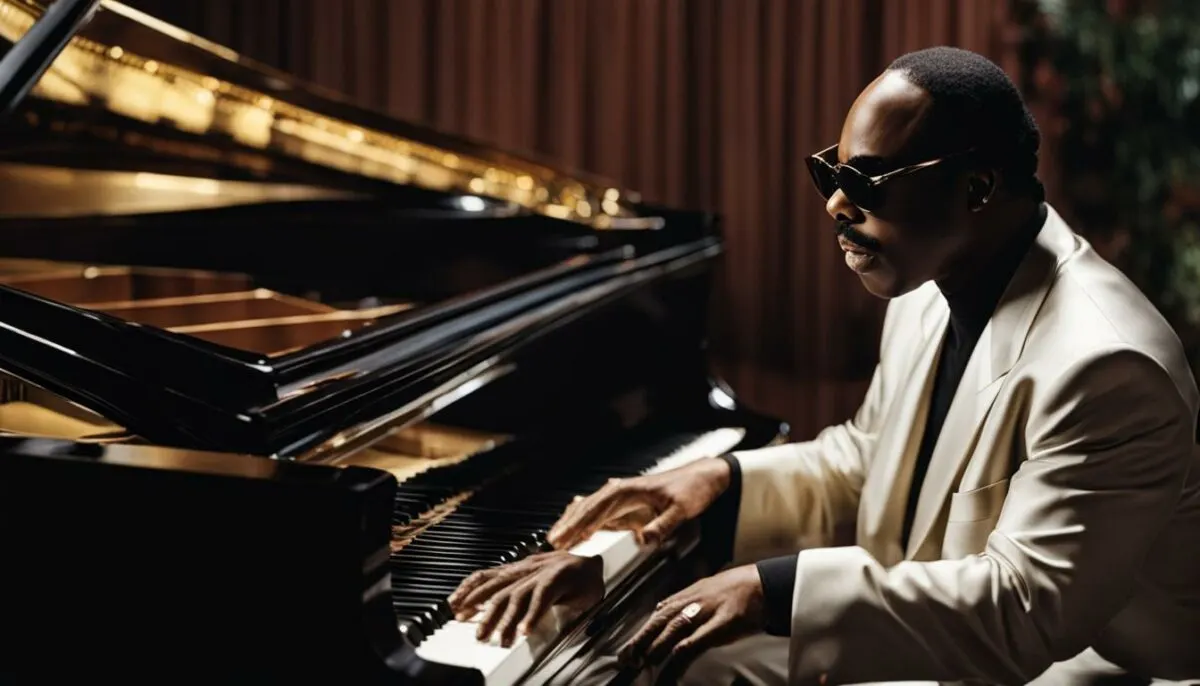
Stevie Wonder is one of the most famous blind musicians of all time, known for his exceptional musical talent and iconic songs. He defied expectations and overcame adversity early in his career when he fought to gain control of his own music and break free from the industry’s influence. Despite his blindness, he continues to create music to this day and remains an influential figure in the world of music.
Andrea Bocelli
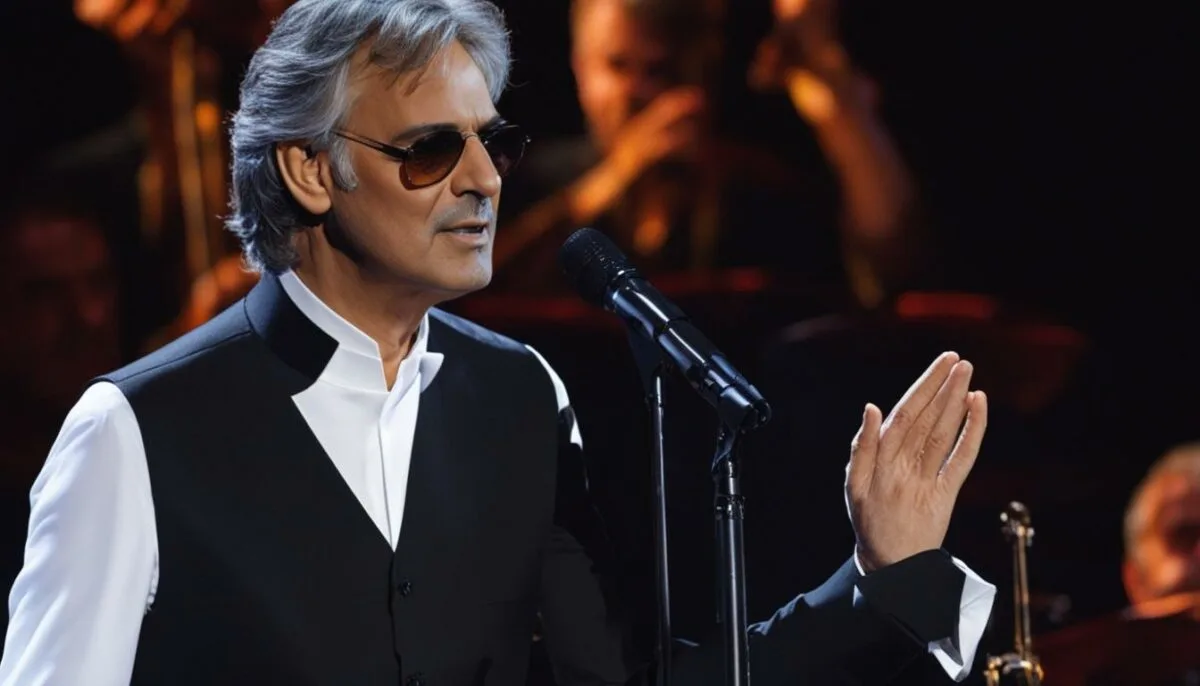
Andrea Bocelli is an Italian tenor who has sold over 90 million records worldwide. He lost his sight at the age of 12 due to a football accident, but his passion for music remained undeterred. He went on to study law and music, eventually becoming a successful opera singer. He is known for his exceptional vocal range and emotional performances, inspiring audiences all over the world.
Ray Charles
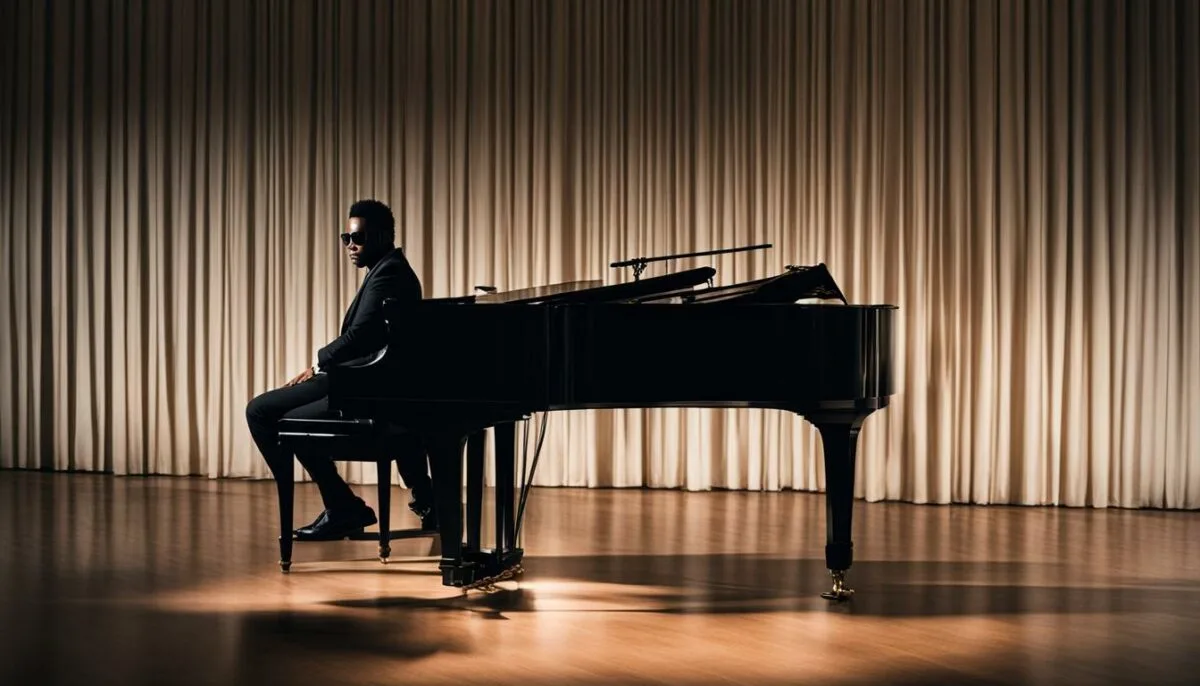
Ray Charles, also known as “The Genius,” was a pioneer of soul music and one of the most influential musicians of the 20th century. He lost his sight at the age of 7 due to glaucoma, but he never let it hold him back. He combined elements of gospel, blues, and R&B to create his own unique sound, which had a profound impact on the music industry. He won numerous awards throughout his career, including 17 Grammy Awards, and his music continues to be celebrated to this day.
Jeff Healey
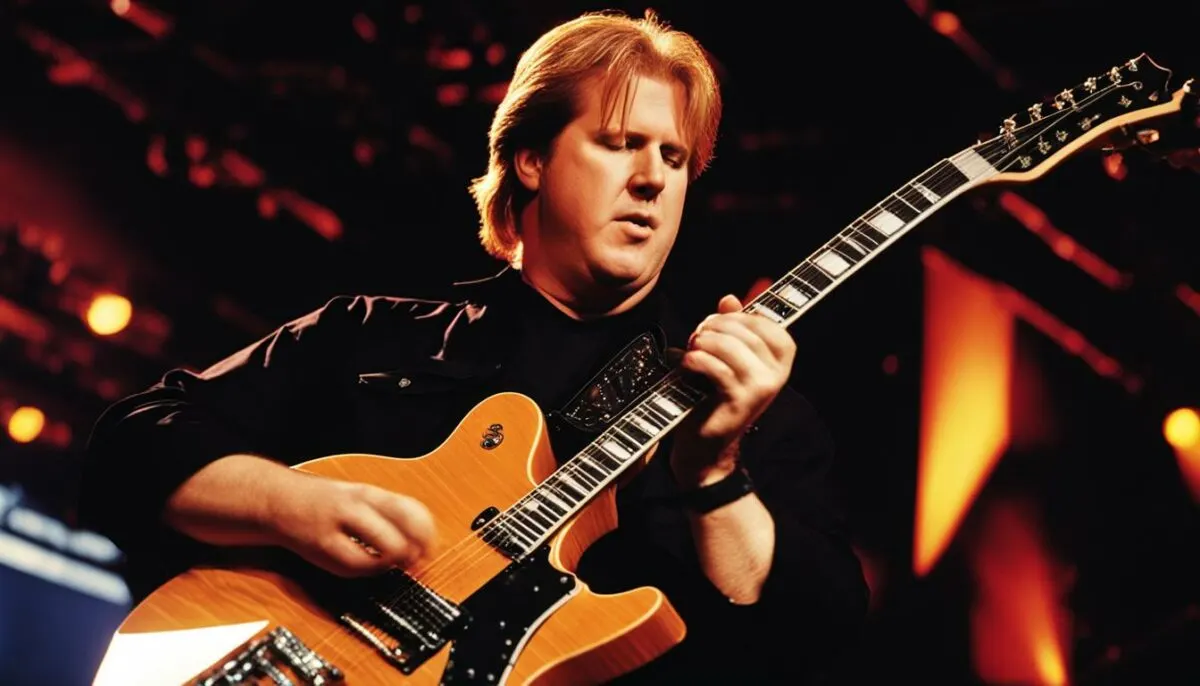
Jeff Healey was a Canadian guitarist and singer known for his unique style of playing the guitar on his lap due to his blindness. He lost both his eyes to cancer at the age of 1, but he developed a love for music at a young age and went on to become a successful musician. He formed the Jeff Healey Band in the 1980s, which gained international fame with the hit song “Angel Eyes.” He remained active in the music industry until his death in 2008, leaving behind a legacy of remarkable talent.
Raul Midón
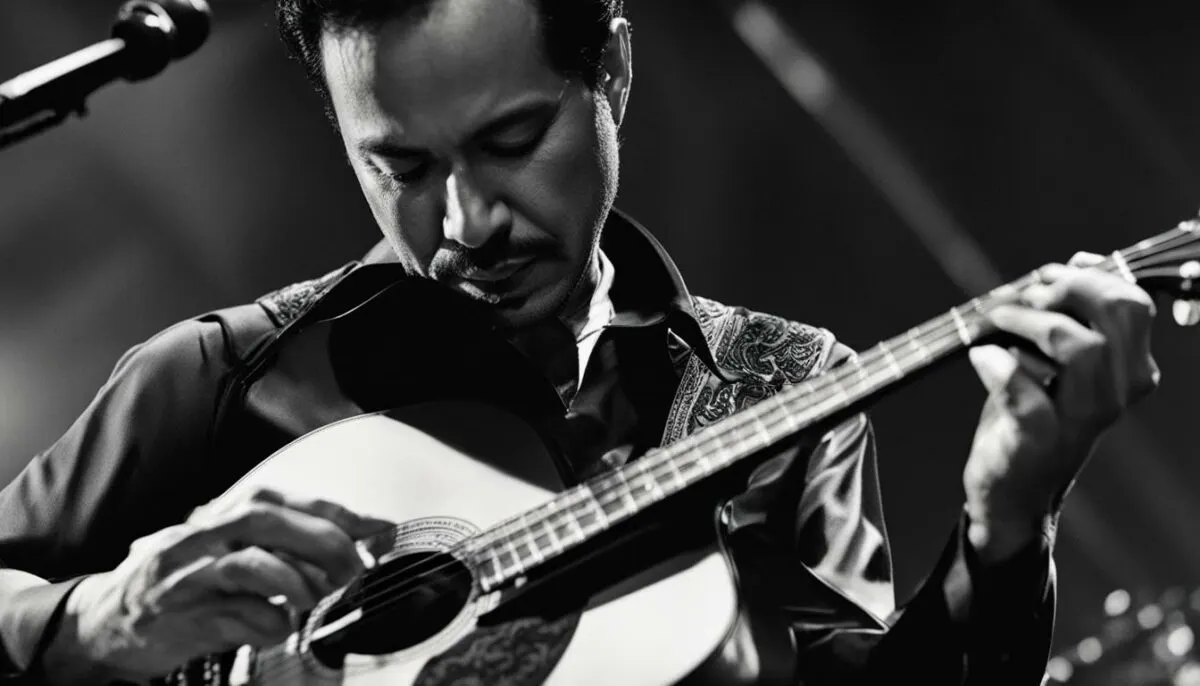
Raul Midón is an American singer-songwriter and guitarist who has recorded with a number of notable musicians, including Shakira, Stevie Wonder, and Jason Mraz. He lost his sight at birth due to retinopathy of prematurity, but he developed a love for music at a young age and eventually pursued a career as a musician. He is known for his soulful voice and impressive guitar skills, and his music is celebrated worldwide.
These are just a few examples of blind musicians who have overcome adversity and achieved remarkable success in the music industry. Their stories serve as a reminder that with talent, perseverance, and determination, anything is possible.
Blind Musicians in the Music Industry
Blind musicians have made significant contributions to the music industry, showcasing their unique talents and abilities across various genres. From classical pianists to blues guitarists, they have left an indelible mark on the industry and continue to inspire new generations of musicians.
One of the most notable blind musicians in the industry is Ray Charles. Charles’ soulful voice and impeccable piano skills earned him numerous accolades, including 17 Grammy Awards. He was a pioneer of soul music and crossed over into pop and country, leaving a lasting legacy on the industry.
Another blind musician who made a significant impact is Stevie Wonder. Wonder’s multi-instrumentalist skills and smooth vocals earned him 25 Grammy Awards and over 100 million record sales worldwide. His contributions to funk, soul, and R&B have influenced countless musicians and continue to be celebrated today.
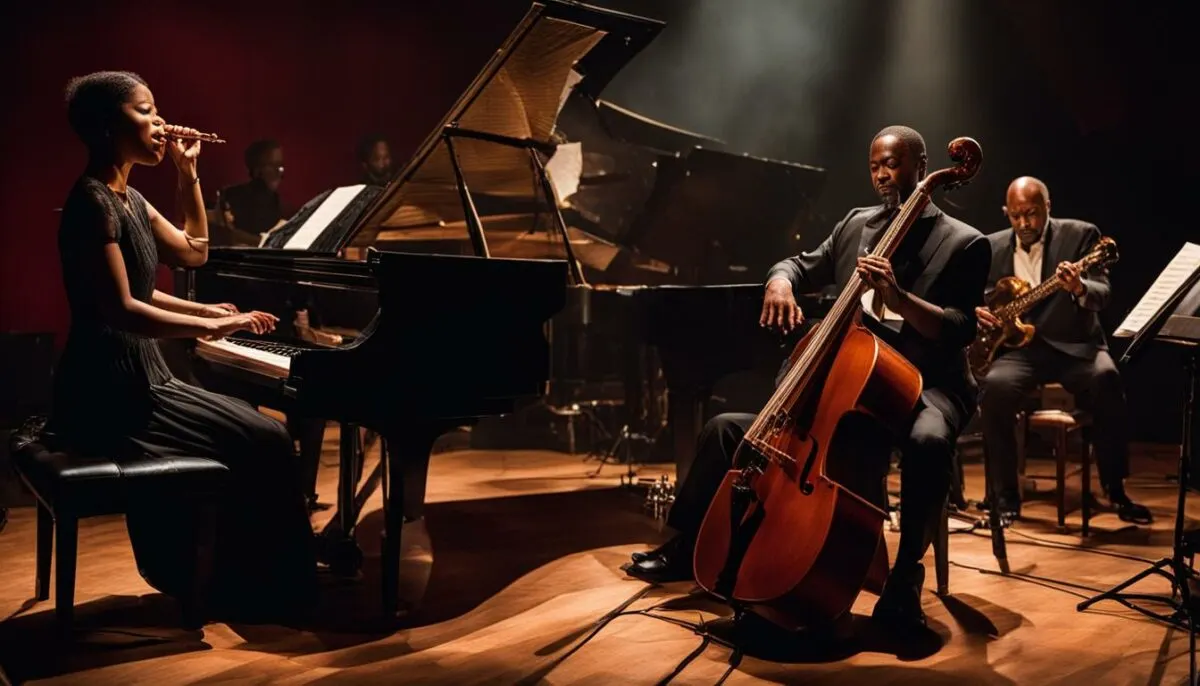
Blind musicians’ presence in the industry extends beyond just their exceptional musical abilities. They have also been advocates for inclusivity and accessibility in the industry, creating a more diverse and welcoming space for all musicians.
Organizations like the National Federation of the Blind Music Division and the American Foundation for the Blind have supported visually impaired musicians by providing resources, networking opportunities, and advocating for accessibility in the industry.
Blind Musicians vs. Sighted Musicians
Blind musicians face unique challenges in the industry, particularly when it comes to navigating live performances and recording studios.
However, many blind musicians have developed exceptional aural skills, allowing them to compensate for their lack of vision in ways that sighted musicians cannot. They are often able to hear nuances in music that others miss and have a heightened ability to improvise and create music on the spot.
Overall, blind musicians have proven that their musical abilities know no bounds and continue to make significant contributions to the music industry.
Famous Blind Musicians Who Changed the Game
Throughout history, there have been countless blind musicians who have left an indelible mark on the music world. From jazz to rock, classical to folk, blind musicians have excelled in various genres and made significant contributions to the industry. Here are just a few of the most famous blind musicians who changed the game:
| Musician | Genre | Notable Works |
|---|---|---|
| Stevie Wonder | Soul, R&B, Pop | “Superstition,” “I Just Called to Say I Love You,” “Living for the City” |
| Ray Charles | Soul, R&B, Blues | “Hit the Road Jack,” “Georgia On My Mind,” “What’d I Say” |
| Andrea Bocelli | Classical, Pop | “Con te partirò,” “Vivo per lei,” “The Prayer” |
| Jeff Healey | Blues, Rock | “Angel Eyes,” “See the Light,” “Roadhouse Blues” |
| Diane Schuur | Jazz, Pop | “Deedles,” “Love Walked In,” “Timeless” |
These famous blind musicians had unique styles, iconic songs, and lasting legacies that continue to inspire and influence musicians today. Their inability to see did not stop them from pursuing their dreams and creating music that touched the hearts of millions around the world.
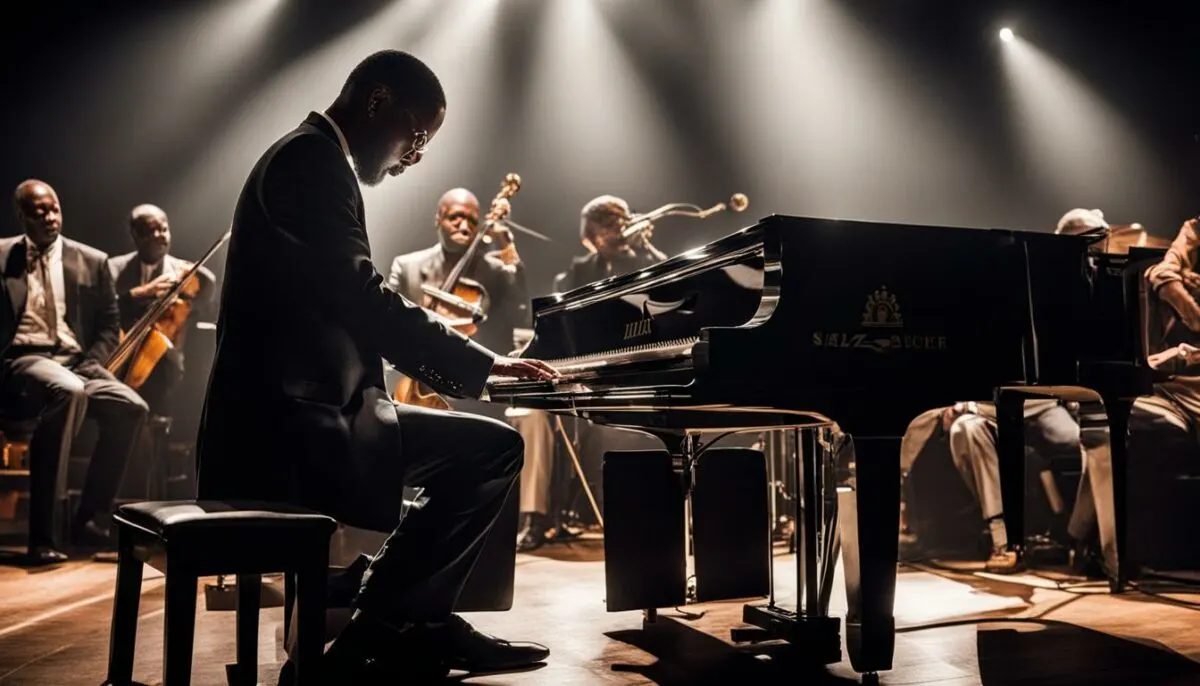
The Discography of Blind Musicians
Blind musicians have made significant contributions to the world of music across various genres, showcasing exceptional talent and creativity. Let’s take a closer look at some of the most remarkable albums and hit songs in the discography of blind musicians.
| Artist | Album | Hit Songs |
|---|---|---|
| Stevie Wonder | Innervisions (1973) | “Living for the City”, “Higher Ground”, “Don’t You Worry ’bout a Thing” |
| Ray Charles | The Genius of Ray Charles (1959) | “Let the Good Times Roll”, “Drown in My Own Tears”, “Hallelujah, I Love Her So” |
| Andrea Bocelli | Viaggio Italiano (1995) | “Con Te Partirò”, “Vivo per Lei”, “Romanza” |
| Jeff Healey | Feel This (1992) | “Cruel Little Number”, “Baby’s Lookin’ Hot”, “House That Love Built” |
| Raul Midón | State of Mind (2005) | “State of Mind”, “Sunshine (I Can Fly)”, “Sittin’ in the Middle” |
Stevie Wonder’s Innervisions, released in 1973, is considered a landmark album. The album features his signature blend of soul, funk, and jazz and includes hit singles such as “Living for the City” and “Higher Ground.” Ray Charles, a pioneer in the R&B and soul genres, released The Genius of Ray Charles in 1959, which became a classic of the genre. Andrea Bocelli, the Italian tenor, has released numerous albums, but Viaggio Italiano (1995) remains one of his most iconic records featuring beloved songs like “Con Te Partirò”.
Jeff Healey was a Canadian guitarist and vocalist known for his unique blend of blues and rock music. His second studio album, Feel This (1992), features hit songs like “Cruel Little Number” and “Baby’s Lookin’ Hot.” Raul Midón, an American singer-songwriter, and guitarist, released his debut solo album State of Mind in 2005 to critical acclaim, showcasing his smooth, soulful vocals and virtuosic guitar playing.
Blind musicians have excelled in a broad range of musical genres, including rock, pop, R&B, classical, and jazz. Their discography serves as a testament to their remarkable talent and the power of music to transcend boundaries of perception and ability.
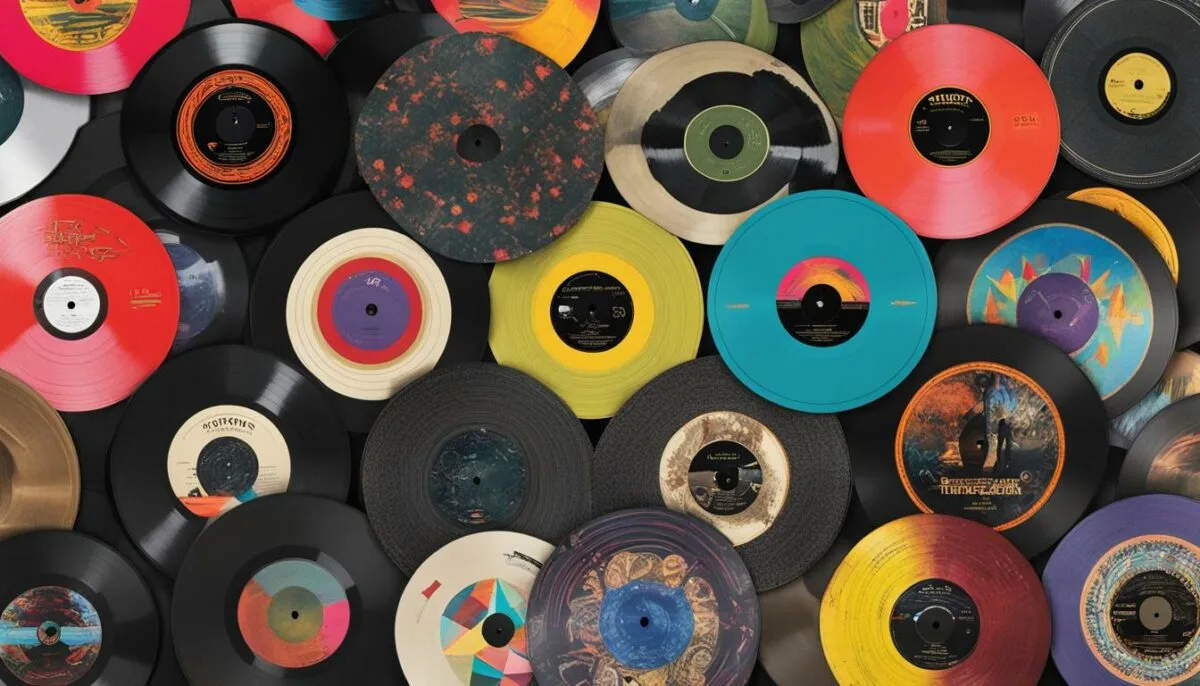
Collaborations with Blind Musicians
Blind musicians are known for their exceptional ability to connect and create music with other artists, regardless of their visual impairment. These collaborations not only showcase their versatility and adaptability but also highlight the power of music to bring people together.
One notable example of a blind musician collaboration is the partnership between Stevie Wonder and Paul McCartney. The duo collaborated on the hit song “Ebony and Ivory,” which became a chart-topping success and showcased their unique styles and talents.
Another noteworthy collaboration involving a blind musician is Ray Charles’ work with Willie Nelson. The two artists came together to record the album “Seven Spanish Angels,” which featured their incredible vocal abilities and highlighted their shared love of music.
Blind musicians have also collaborated with a range of other artists across various genres, from rock to country to hip hop. For example, Andrea Bocelli has sung duets with the likes of Celine Dion and Ed Sheeran, while blind blues guitarist Blind Willie Johnson famously collaborated with his wife Angeline on multiple recordings.
These collaborations demonstrate the power of blind musicians to break down barriers and connect with others through their music. They also highlight the importance of inclusivity and diversity in the music industry, as blind musicians continue to inspire and create alongside their sighted peers.
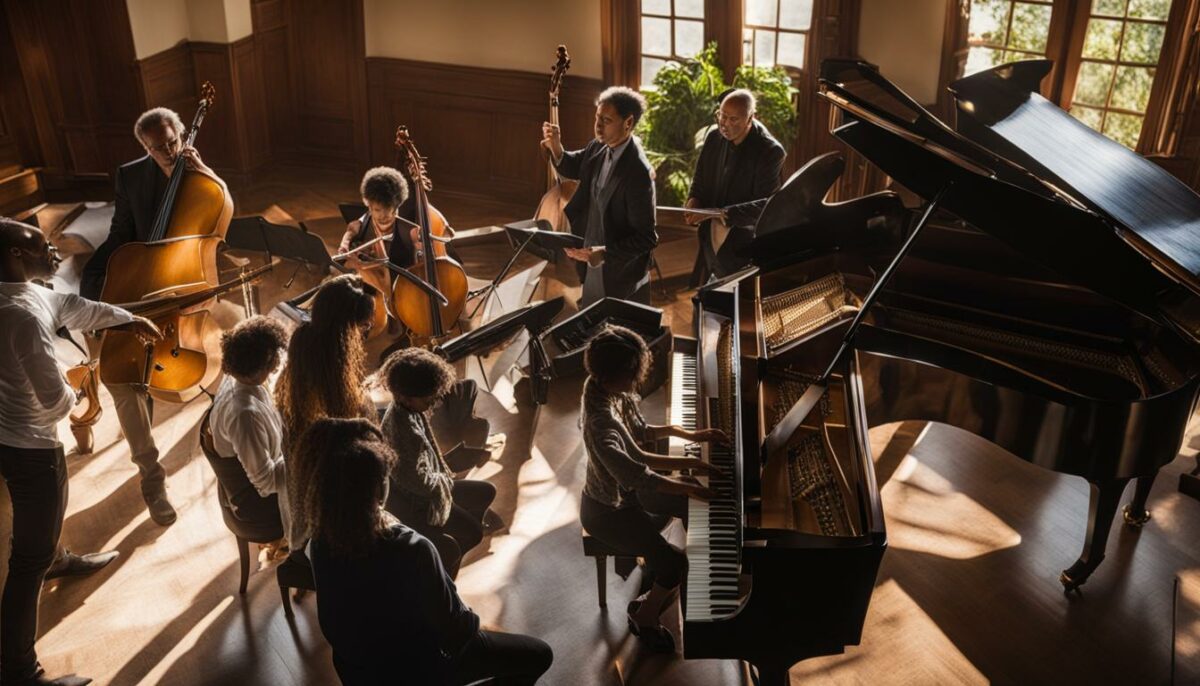
The Talent and Musicality of Blind Musicians
Blind musicians possess an exceptional talent and musicality that sets them apart from their sighted counterparts. Their lack of vision does not hinder their ability to create and perform music, but rather enhances it, allowing them to perceive and interpret sound in unique ways.
Many blind musicians display an innate sense of pitch and rhythm, honed through years of practice and dedication to their craft. Stevie Wonder, for example, is known for his impressive musical abilities, playing a variety of instruments and creating timeless hits that have resonated with audiences for decades.
Other blind musicians showcase a remarkable ability to improvise and experiment with different sounds and genres. Ray Charles, a blind pianist and singer, pioneered a new style of music that blended elements of gospel, blues, and jazz, influencing generations of musicians to come.
Blind musicians and composition
Blind musicians are also renowned for their ability to compose music, often drawing inspiration from their personal experiences and emotions. José Feliciano, a blind singer-songwriter, wrote the iconic ballad “Feliz Navidad,” which has become a staple of holiday music around the world.
Moreover, blind musicians are often skilled at arranging and orchestrating music as well. Benny Carter, a blind saxophonist and composer, arranged music for artists such as Ella Fitzgerald and Louis Armstrong, showcasing his versatility and musicality.
The impact of blindness on music
Blindness has not only influenced the talent and musicality of blind musicians but has also shaped the sound and style of music as a whole. Blind musicians have made significant contributions to various genres, from classical music to hip hop, redefining what is possible in the world of music.
Their unique perspective on sound and rhythm has inspired countless artists and has challenged the norms and conventions of the music industry. Blind musicians have proven that talent and creativity have no boundaries, and that music is a universal language that can be felt, regardless of one’s visual ability.

“Blindness is an inconvenience, but it is not and should not be a hindrance to achieving one’s goals.” – Stevie Wonder
The quote from Stevie Wonder reflects the determination and perseverance that blind musicians possess, overcoming the barriers and obstacles that they encounter throughout their musical journeys. Their talent and musicality are a testament to their indomitable spirit and their ability to triumph over adversity.
In conclusion, the talent and musicality of blind musicians are truly remarkable, showcasing the incredible possibilities that exist when one’s passion and dedication meet with innate ability. Blind musicians have left an indelible mark on the world of music, inspiring generations of musicians and pushing the boundaries of what is possible in the industry.
Drawing Inspiration from Blind Musicians
Blind musicians are a source of inspiration for music lovers and aspiring musicians alike. Their remarkable talent, perseverance, and determination in the face of adversity serve as a reminder of the human spirit’s boundless capacity to overcome challenges.
Listening to the music of blind musicians can be a transformative experience. It enables one to appreciate the power of music and its ability to transcend barriers of all kinds. Blind musicians inspire us to look beyond surface-level differences and to appreciate the beauty of diversity.
Blind musicians also serve as role models for aspiring musicians. Their stories and achievements are a testament to the importance of hard work, dedication, and resilience in pursuing one’s dreams.
Furthermore, blind musicians inspire us to challenge our own limitations and to push beyond our boundaries. They show us that anything is possible with determination, hard work, and a passion for what we love.
As we celebrate the remarkable talent and achievements of blind musicians, let us draw inspiration from their stories and their music. Let us embrace the power of music to transcend barriers and unite us in a common love for art, creativity, and expression.
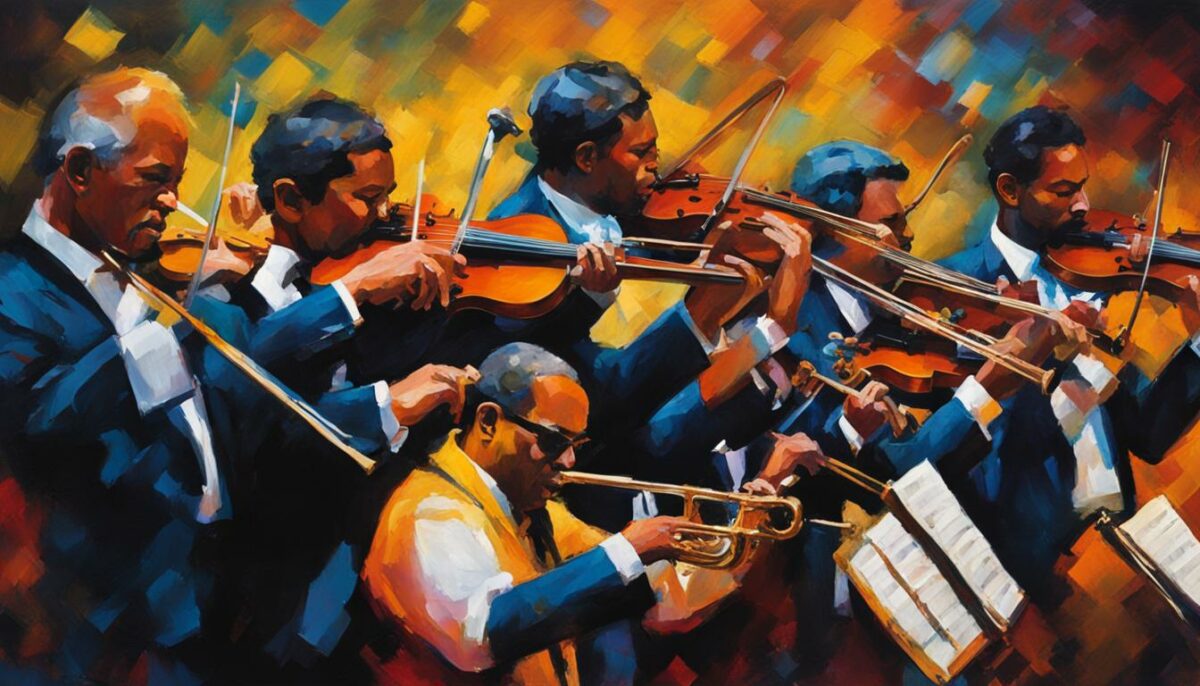
Changing Perceptions: The Power of Blind Musicians
Blind musicians and visually impaired artists have the power to challenge stereotypes and change perceptions about disability in the music industry. These talented individuals showcase their exceptional abilities, demonstrating that being blind does not hinder their musicality or creativity. By breaking down barriers and defying expectations, they are paving the way for greater inclusivity and diversity in the field of music.
Blind musicians are a source of inspiration for both aspiring musicians and music lovers alike. Their stories and music have the power to move and motivate individuals, inspiring them to pursue their own passions and dreams. Their successes are a reminder that anything is possible with perseverance, determination, and talent.
By showcasing the immense talent and resilience of blind musicians, we can celebrate their contributions to the world of music and promote greater understanding and acceptance of disabilities. Through increased awareness and support, we can help create a more accessible and inclusive music industry for all musicians, including blind musicians and visually impaired artists.
Breaking Stereotypes
Blind musicians have the ability to break down stereotypes and misconceptions about blindness and disability in the music industry. They show that blindness does not define them or limit their musical abilities, emphasizing that they can achieve the same level of success as sighted musicians.
Moreover, blind musicians challenge the idea that music is a visual art form. They demonstrate that music can be experienced and created through a range of senses, including hearing, touch, and memory. Their unique approach to music can inspire others to think beyond traditional definitions and expectations of what music can be.
Inspiring Accessibility
The successes of blind musicians also inspire the creation of greater accessibility in the music industry. Organizations and resources that support blind musicians are essential in breaking down the barriers and promoting inclusivity.
Assistive technology plays an important role in enabling blind musicians to pursue their passions. From screen reading software and Braille music notation to adaptive instruments and audio production tools, these technologies provide a level playing field for blind musicians and allow them to express themselves creatively.
Conclusion
Blind musicians and visually impaired artists have the power to change perceptions and promote inclusivity in the music industry. Their incredible talent, perseverance, and determination serve as an inspiration for all aspiring musicians and music lovers. By celebrating their achievements and promoting accessibility, we can help create a more diverse and inclusive music industry that benefits everyone.

Support Systems for Blind Musicians
Blind musicians and visually impaired artists require specialized support systems to help them navigate the challenges they face in the music industry. Fortunately, there are numerous organizations, technologies, and resources available to assist them on their musical journeys.
One such organization is the American Foundation for the Blind, which provides numerous resources for blind musicians, including information on accessible music technology and tips for practicing and performing.
The National Library Service for the Blind and Print Disabled also offers a vast collection of braille and audio books on music theory, history, and biographies of famous musicians. This service can be accessed through local libraries or online.
In terms of technology, numerous tools are available to assist blind musicians in composing and performing music. Programs like ZoomText and Window-Eyes offer screen reader software that reads text on a computer screen aloud, while BrailleNote and Refreshable Braille Displays provide braille output for music notation.
Physical support systems also play an integral role in assisting blind musicians. Music stands with adjustable heights and angles allow for easier reading of music, while foot pedals that activate page turning offer hands-free navigation of sheet music.
| Organization | Services Offered |
|---|---|
| American Foundation for the Blind | Information on accessible music technology, practice and performance tips |
| National Library Service for the Blind and Print Disabled | Collection of braille and audio books on music theory and biographies of famous musicians |
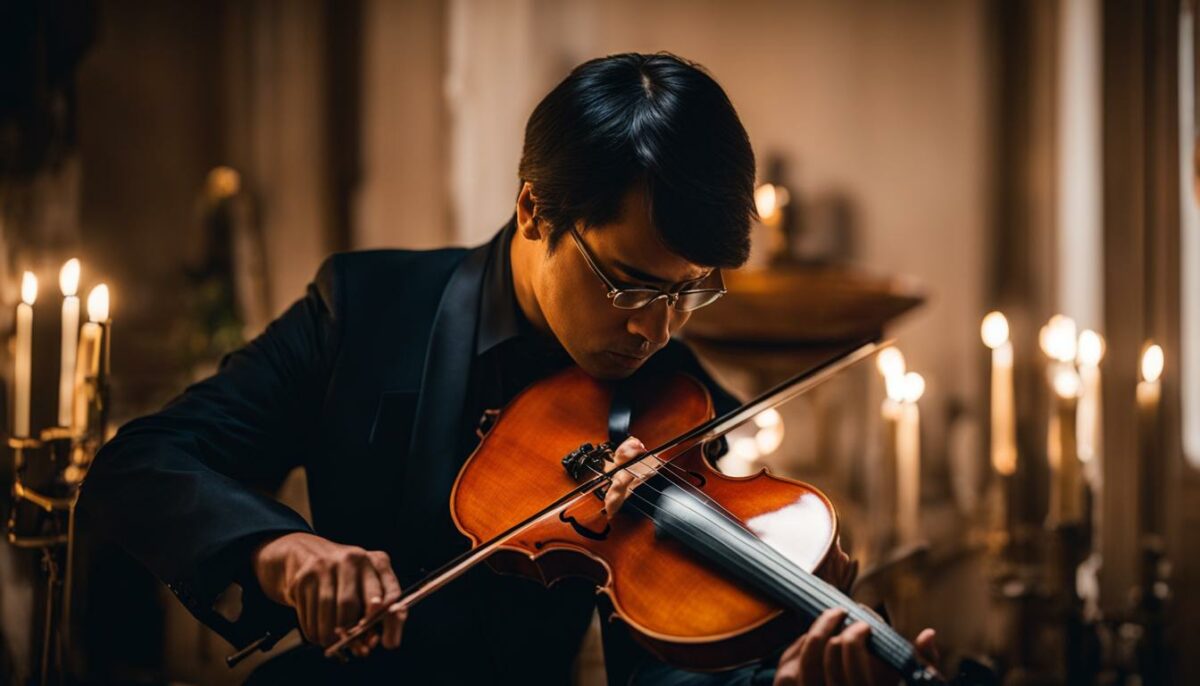
These support systems not only assist blind musicians, but also reinforce the importance of accessibility and inclusivity in the music industry. By providing equal opportunities and resources, we can empower talented musicians with visual impairments to showcase their abilities and make their mark in the world of music.
Celebrating the Legacy of Blind Musicians
Blind musicians have left an indelible mark on the music industry, changing perceptions and inspiring generations. Their legacies continue to live on, reminding us of their remarkable talent and resilience.
One of the most iconic blind musicians is Stevie Wonder. He is a true inspiration for those who face adversity and obstacles, having achieved unparalleled success in the music industry. His soulful voice and unique style have earned him numerous accolades, including 25 Grammy Awards. Blind since birth, Wonder’s remarkable ability to connect with his audience through music showcases the incredible talent and musicality of blind musicians.
Another celebrated blind musician is Ray Charles. He revolutionized the music industry with his unique blend of R&B, soul, and jazz. Despite losing his sight at the age of seven, Charles went on to become one of the most influential musicians of the 20th century, with hits like “Georgia on My Mind” and “Hit the Road Jack.”
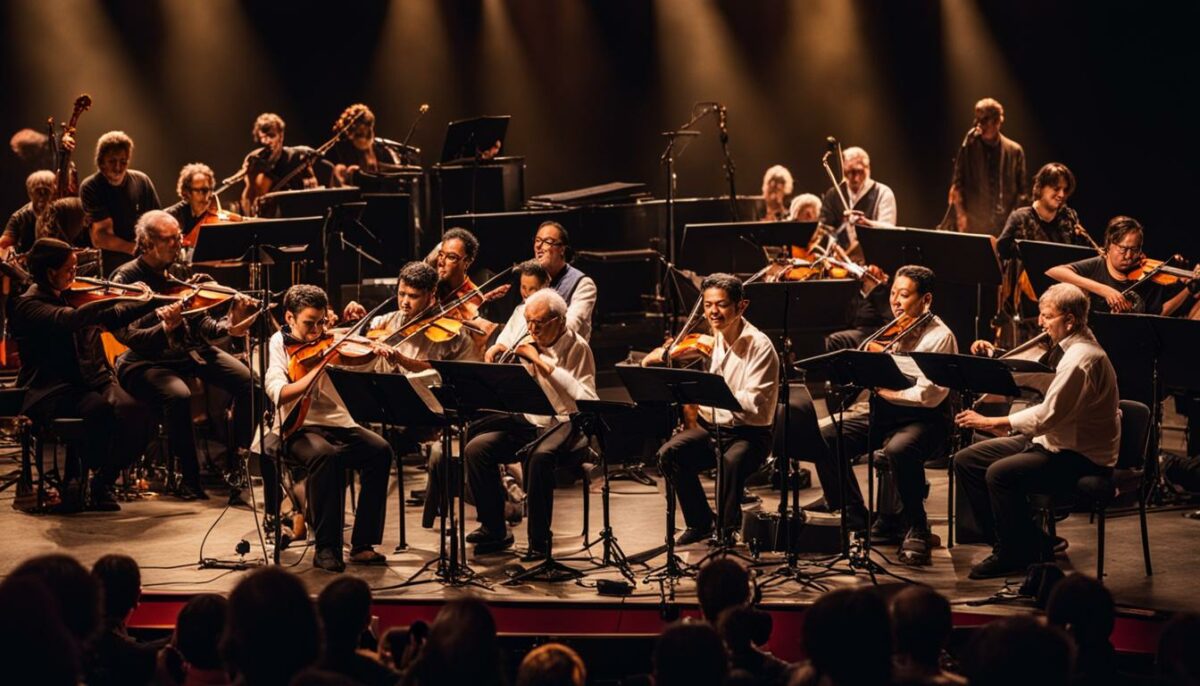
Blind musicians have also made significant contributions to various genres, including classical music. Blind pianist Nobuyuki Tsujii, for instance, has become renowned for his exceptional ability to interpret and perform complex classical pieces. Similarly, blind jazz pianist Art Tatum was known for his lightning-fast fingers and improvisational skills, becoming one of the most influential jazz pianists of his time.
The enduring legacy of blind musicians reminds us of the importance of diversity and inclusivity in the music industry. It also highlights the power of perseverance and determination in the face of adversity. Blind musicians have shown us that anything is possible with passion, hard work, and a deep love for music.
Conclusion
Blind musicians and visually impaired artists continue to demonstrate their remarkable talent, perseverance, and resilience in the world of music. Despite the unique challenges they face, they have triumphed over adversity and left an indelible mark on the industry. Their success stories inspire and motivate others to pursue their dreams and overcome obstacles.
Blind musicians have contributed diverse and innovative styles to the music industry, creating iconic songs and albums across genres. Their ability to collaborate and connect with other artists showcases their versatility and adaptability. They challenge stereotypes and change perceptions about disability in the music industry, emphasizing the importance of inclusivity and diversity.
The support systems available for blind musicians, including organizations, technology, and resources, play a crucial role in their musical journeys. These systems ensure accessibility and help overcome barriers, enabling visionless virtuosos to pursue their dreams.
We celebrate the enduring legacy of blind musicians and their lasting impact on the world of music. Their talent, resilience, and influence will continue to inspire and uplift music lovers for generations to come.
FAQ
What is the remarkable talent of blind musicians?
Blind musicians possess an exceptional ability to create beautiful music without the use of sight. Their talent and musicality are truly remarkable.
What are the challenges faced by blind musicians and visually impaired artists?
Blind musicians and visually impaired artists encounter unique challenges in pursuing their musical careers. These include barriers to accessibility, limited resources, and societal misconceptions about their abilities.
Can you share some success stories of blind musicians?
Certainly! There are numerous inspiring success stories of blind musicians who have overcome adversity and achieved remarkable milestones in their musical careers. Their stories serve as a testament to their perseverance, determination, and talent.
How do blind musicians contribute to the music industry?
Blind musicians make significant contributions to the music industry across various genres. Their unique perspectives and musical styles enrich the industry and inspire other artists.
Who are some famous blind musicians?
There are several famous blind musicians who have left an indelible mark on the music world. Their iconic songs and lasting legacies continue to resonate with audiences worldwide.
What is the discography of blind musicians like?
The discography of blind musicians encompasses a diverse range of musical genres. They have released albums, hit songs, and notable recordings that showcase their exceptional talent and creativity.
Do blind musicians collaborate with other artists?
Absolutely! Blind musicians often collaborate with other artists, showcasing their versatility and ability to create music that transcends boundaries. These collaborations result in unique and inspiring musical experiences.
What sets blind musicians apart in terms of talent and musicality?
Blind musicians possess an incredible talent and musicality that is shaped by their unique ways of perceiving and interpreting music. Their ability to create music without the use of sight is extraordinary.
How do blind musicians inspire others?
The stories and music of blind musicians serve as a powerful source of inspiration for aspiring musicians and music lovers alike. Their resilience, passion, and achievements inspire others to pursue their own dreams.
How do blind musicians challenge stereotypes in the music industry?
Blind musicians challenge stereotypes about disability in the music industry by showcasing their exceptional talent and proving that visual impairment does not hinder their ability to create incredible music. They emphasize the importance of inclusivity and diversity in the field of music.
What support systems are available for blind musicians?
There are various organizations, technology, and resources that provide support to blind musicians in their musical journeys. These support systems aim to enhance accessibility and ensure that blind musicians have equal opportunities in the music industry.
How can we celebrate the legacy of blind musicians?
We can celebrate the legacy of blind musicians by remembering and honoring their contributions to the music world. Recognizing their talent, resilience, and lasting influence showcases the importance of their remarkable journeys.